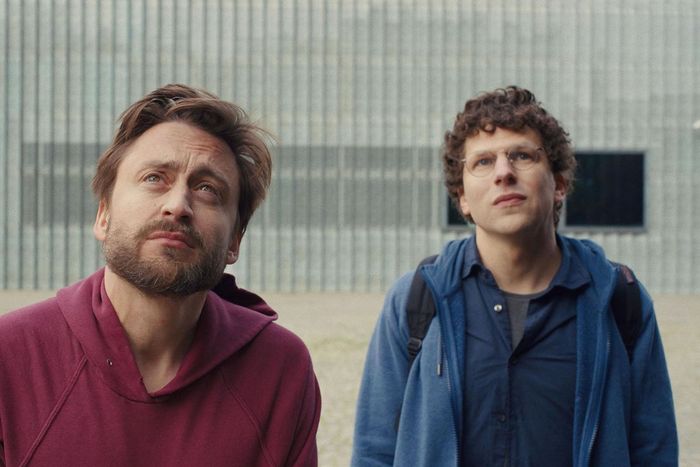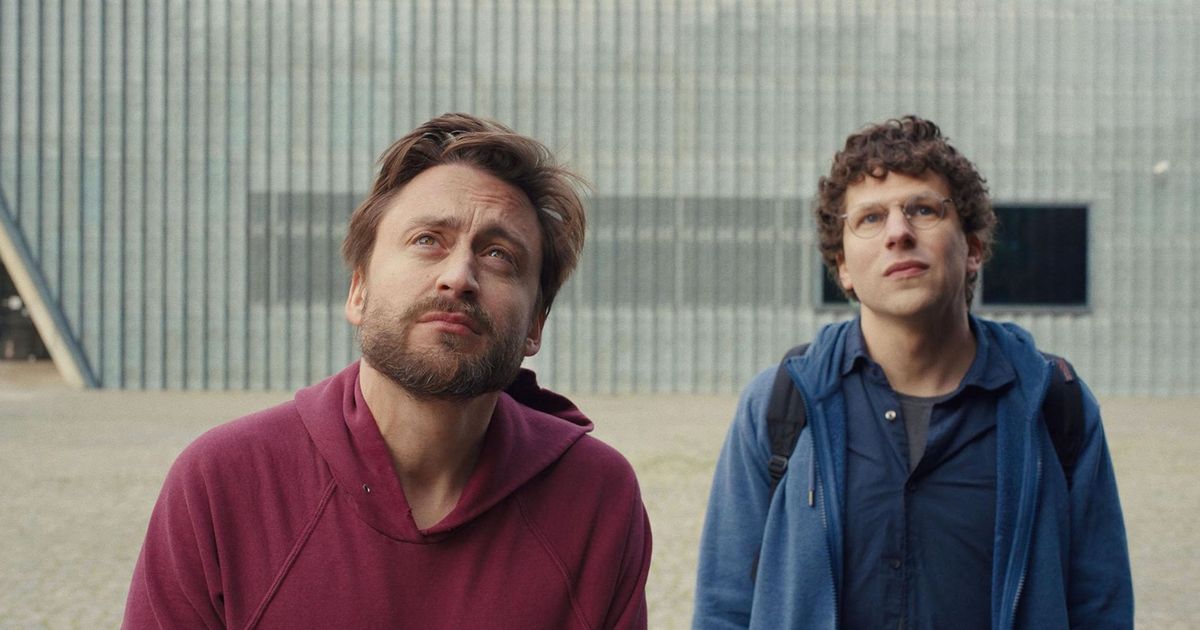
Jesse Eisenberg’s charming Sundance breakout moves gently and smoothly but hints at an all-consuming darkness underneath.
Photo: Searchlight
A touching character study anchored by a lively Kieran Culkin performance, Jesse Eisenberg’s A Real Pain moves gently and smoothly but hints at an all-consuming darkness underneath. The film, one of the breakout titles in the early days of this year’s Sundance, was bought by Fox Searchlight immediately after its world premiere, and it’s not hard to see why. The picture’s charming modesty is its great virtue; it’s a light movie with a heavy heart.
Structured like a travelogue, A Real Pain follows two cousins on a Holocaust tour through modern-day Poland. The trip is a gift bequeathed them by their recently deceased grandmother, who wanted them to see the country she left many decades ago. Watching them bicker and bond as they visit war memorials, cemeteries, and the Majdanek concentration camp, however, we begin to wonder if maybe what Grandma really hoped for was that these two souls would find a way to reconcile their differences.
It might feel odd at first to see a comedy play out against a backdrop of such grim locations, but it becomes clear soon enough that this is partly the point of the movie. As the outgoing and messy Benji Kaplan, Culkin brings some of the same performative apathy he brought to the role of Roman Roy on HBO’s Succession. But there, you wanted to strangle the little jerk; here, it becomes clear early on that Benji doesn’t really know how to exist in the world. “I love him, and I hate him, and I want to kill him, and I want to be him,” says his cousin Dave (Eisenberg), who by contrast is a petri dish of anxieties, a guy forever fixated on doing the right thing because he’s terrified of what might happen if he doesn’t.
The manic Benji is frivolous and jokey one minute, strident and uncompromising the next. He can exhort his fellow travelers to join him in making goofy poses in front of a war memorial, then yell at their diligent tour guide (Will Sharpe) for giving them too much information on a visit to an ancient Jewish cemetery. When their tour group takes a train ride in first class, Benji revolts. “We’re Jews in a fucking train car in Poland!” he yells, overcome by what he sees as the dissonance of the moment. When he and Dave later sneak onto another train and discover they’re back in first class, he tells Dave, “We fucking earned it.”
Characters in film are often defined in bold, clear strokes that speak to the consistency of their traits. It’s a testament both to Culkin’s performance and to Eisenberg’s writing and directing that Benji’s whipsawing antics never feel like a misstep for the movie. The more we see of Benji, the harder he becomes to pin down. On the one hand, the man is a pure charmer. He makes fast friends with the TSA agents at the airport security line and demonstrates an amazing ability to convince people to do things for him and with him. But he’s also offensive, mercurial, incapable of holding back. “Do you see what happens when you walk into a room?” Dave tells Benji at one point. “I would give anything to know what that feels like.” The truth is that Benji probably doesn’t know what happens when he walks into a room. He has no idea what others think of him, because he’s too lost inside.
So, uh, what about the whole Holocaust thing? The dynamic between Benji and Dave is about more than two estranged and very different cousins. It’s about how we can live in a world of infinite evil and madness and still make it through the day — how we “ignore the proverbial slaughterhouse to enjoy the steaks,” as one character puts it. For the buttoned-up Dave, it’s not possible to worry about all the suffering in the world. Benji doesn’t have that luxury, in part because he himself is clearly suffering inside.
The film’s pleasant surfaces and soft rhythms, set to several familiar Chopin pieces, embody the dissonance surrounding the characters. At one point, the tour guide asks them to look around the city of Lublin and imagine a vibrant town with markers of Jewish life, “little pieces of history peering out, waiting for us.” As the guide speaks of Hebrew schools, county councils, tailors, and dry-goods shops, we see indifferent angles of the city: nondescript apartment blocks, empty alleys, street signs. We would never really know what these places were from the outside, it seems. The same goes for people.
See All
